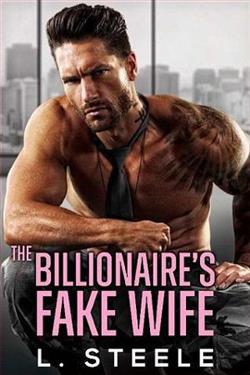Page 90 of Diamond Ring
“Hey,” Alex says again, louder, like he might to a pitcher being argumentative on the mound. Both Evie and Sofia stop, though their anger hovers. “You want to tell me what’s going on?”
He expects more yelling, possibly doors slamming, Evie driving off in a screech of tires. Not her sudden burst of tears.
Jake, who’s been sitting quietly next to him, gets up, the scrape of his chair on the deck loud. “I’m gonna head in.” He presses a kiss to Alex’s hair, then retreats, followed by Sofia and Marianne.
“Evie, is everything okay?” Alex asks, though it’s clear it’s not, and he’s hit with a wash of wanting to fix whatever it is, even if he probably can’t. He doesn’t have any napkins, and he’s half-tempted to offer the sleeve of his shirt for Evie to dab her eyes on if he didn’t think it’d make her cry harder.
Instead, she rises, wiping her hand across her face. “I made you something.” She plucks his wineglass from the tabletop then descends the deck stairs to the soft, clover-covered earth of the backyard.
The shed has a set of LED touch-lights that Evie taps on, casting light on normal shed stuff: power tools, shovels, the twisted tines of a garden claw. And a large square object wearing a cloth drape that she approaches like it might lunge at her.
“Don’t laugh,” she says, as if Alex was going to. She fiddles with the cloth, not raising it.
He doesn’t say anything—not anI’m sure it’s great, because that will sound condescending, like she made something to be hung on the refrigerator and not a serious artistic endeavor. “I won’t,” he says, and she peels back the drop cloth.
A painting, different from her usual style, photo-realistic but with abstract dashes of color. Him, recognizably, in his catcher’s gear, ready to field an unseen ball, the implication of ballpark lights, the potential for failure or success just beyond his grasp.
“Usually you’re not supposed to store canvases outside,” she says. “But I wanted the effect of weathering on the paint itself.”
When he looks closer, a slight warping to the frame, like the painting is in conversation with the environment around it.
“Evie, this is...”
“It’s okay if you don’t like it.” Though the wineglass she took from him wavers in her grip. “I wanted the perspective to be slightly different, and I’m not sure about the color selection—is the green too sentimental? Too obvious?—and rendering hands in motion is always difficult.”
“I love it.”
“You don’t have to say that if you don’t mean it.”
“I do mean it.” He approaches the canvas, taking in its details, the way his mask conceals his expression from the viewer, the tension of his movements. The demand it has, even with its imperfections, to stop and look. “Why don’t you want to do this anymore? You’re good at it.”
“But I’m notgreatat it.”
“No one’s great at anything at nineteen.”
Evie wipes her eyes with her hand. “You were. And they made you work, then took your money.”
A statement that makes him rock back. “I think you might have gotten the wrong impression.”
She shakes her head. “When you came back after visitinghim”—said with an extreme distaste like she can’t bear to say Jake’s name—“you didn’t want anyone to see you crying, but I did. And Sofia told you that you had to go back.”
A conversation Alex remembers. After getting off a plane from Maryland, he spent a blur of days holed up in his room, music on as loud as he could stand it, feeling like the world was pressing him into his mattress, only to emerge to Sofia handing him a shovel and instructions to take out his frustrations on the hard-packed dirt of her hooped winter garden. Followed by a long discussion around their firepit, wrapped up against the New England cold. Sofia, with a bottle of whiskey and encouragement to keep playing through it, if that’s what he wanted. That scar tissue—physical or emotional—was just the sign of a life well-lived. A conversation Evie apparently overheard and filtered through her nine-year-old understanding.
“You remember when you learned to ride a bike?” Alex says. “You were kind of a disaster at it. You kept falling down and scraping your knees and running over to me.”
“You got mad at the asphalt for me,” she says. “You kept calling the street in front of the house a vampire.”
“Itwastrying to bite you.”
Evie laughs.
“I could have let you quit,” Alex says. “But I think you wanted me to tell you to try again. When Sofia told me to go back and play, that’s what it was. I needed to hear someone else say it.”
“What if I don’t want to be an artist?”
“Then don’t be an artist. But don’t not be an artist just because it’s hard. Everything’s hard.”
She lets out a long sigh. “It’s just like...how do I know if I’m any good? What if I try and it’s embarrassing? What if some people hate it?”















